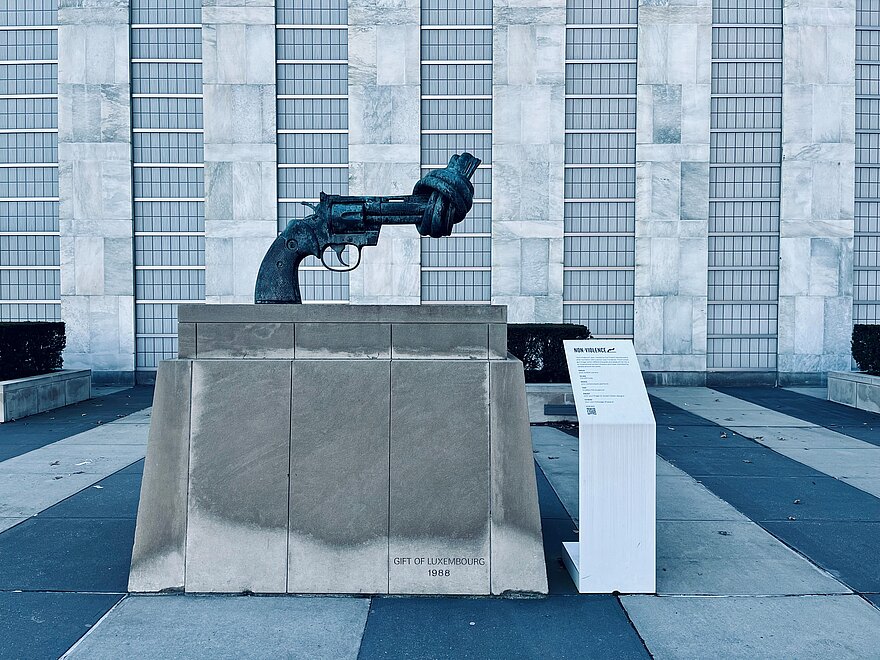16 July 2025, by Dr Pablo Gavira Díaz and Dr Gurgen Petrossian
1.Special session of the Assembly of States Parties to the Rome Statute of the International Criminal Court on the review of the amendments on the crime of aggression
From 7 to 9 July 2025, the Assembly of States Parties (ASP) to the Rome Statute of the International Criminal Court (ICC or Court) convened in New York to review amendments for the crime of aggression. The ASP serves as the management oversight and legislative body of the ICC and is made up of representatives of the States Parties that have ratified or acceded to the Rome Statute. The text of a proposed amendment was submitted to the Secretary-General of the United Nations (UN) by a group of five States Parties to the ICC, namely Costa Rica, Germany, Sierra Leone, Slovenia and Vanuatu. The draft amendment seeks to harmonise the ICC’s jurisdiction over the crime of aggression with the jurisdictional framework that applies to the other core international crimes under the Court’s authority: genocide, crimes against humany and war crimes.
On 9 July 2025, after delegations discussed the ratification, implementation and application of the proposed amendments, the ASP adopted resolution ICC-ASP/S-1/Res.1 by consensus, reaffirming its commitment to strengthening the Court’s jurisdiction over the crime of aggression. To that end, the ASP plans to hold a Special Session in 2029 to consider a proposed amendment, supported by a dedicated subgroup and an intersessional meeting in 2027 to review the progress. This brief commentary examines the context of the drafting, activation and proposed amendments to the crime of aggression at the ICC, as well as the procedural and substantive framework that governs its jurisdiction.
2. The drafting and activation processes of the crime of aggression
Although a definition existed, the Rome Statute did not initially include the crime of aggression among the punishable offences under the ICC’s jurisdiction when it was adopted on 17 July 1998. This was achieved at the Kampala Review Conference in 2010, where the ASP adopted amendments to the Rome Statute that defined the crime of aggression and established the conditions under which the ICC could exercise jurisdiction over it. At the same meeting, it was decided that this jurisdiction could only be activated after 1 January 2017, contingent upon ratification of at least 30 States Parties and a subsequent activation decision by a two-thirds majority of them. These conditions were fulfilled in December 2017, when the ICC ASP formally activated the Court’s jurisdiction over the crime of aggression, effective from 17 July 2018.
The proposed amendments on the crime of aggression discussed in New York from 7 to 9 July 2025 were submitted pursuant to Article 121 (1) of the Rome Statute, which permits any State Party to propose amendments to the Statute after the expiry of seven years from its entry into force. More significantly, the proposal was submitted as part of the mandatory review of the aggression amendments, scheduled seven years after the Court began exercising its jurisdiction over the crime of aggression, in accordance with the decision made by States Parties in Kampala.
3. The definition and jurisdictional framework of the crime of aggression
The crime of aggression is defined by Article 8bis of the Rome Statute as “the planning, preparation, initiation or execution, by a person in a position effectively to exercise control over or to direct the political or military action of a State, of an act of aggression which, by its character, gravity and scale, constitutes a manifest violation of the Charter of the United Nations”. Unlike the other core international crimes under the ICC’s jurisdiction, the crime of aggression limits criminal responsibility to individuals in leadership positions, specifically targeting top political and military figures.
The jurisdictional regime of the crime of aggression is set out in Articles 15bis and 15ter, with the proposed amendments focusing on Article 15bis. This provision governs the ICC’s ability to exercise jurisdiction over the crime of aggression when a situation is not referred by the UN Security Council. In such cases, the Prosecutor may initiate an investigation proprio motu (on his/her own initiative) or upon referral by a State Party, but only if both the aggressor State and the victim State are Parties to the Rome Statute and have ratified the Kampala amendments (this is why the ICC currently lacks jurisdiction to prosecute Russian nationals for the crime of aggression but maintains jurisdiction to investigate and prosecute individuals for war crimes, crimes against humanity and genocide committed on Ukrainian territory).
Additionally, a State Party may opt out of the Court’s jurisdiction over the crime of aggression by lodging a declaration with the Registrar. While the UN Security Council retains primary responsibility for determining acts of aggression, the Court may proceed with an investigation six months after a referral if the Council does not act, subject to authorisation by the Pre-Trial Division.
4. Implications of the proposed amendments on the crime of aggression
The proposed modifications to Article 15bis would end the exclusion of non-States Parties from the Court’s jurisdiction on the crime of aggression, a limitation unique to this specific offence. The amendment would also close the loophole that allows States Parties to shield themselves from prosecution for aggression by not ratifying the aggression amendments. Concerns about expanding the ICC’s jurisdiction amid current investigative challenges are understandable, but aligning the jurisdiction over the crime of aggression with other crimes will not overwhelm the Court. Provisions contained in Articles 8bis, 15bis and 15ter ensure that the ICC’s jurisdiction in this area remains highly restricted.
The slow and uneven ratification of the Kampala amendments on the crime of aggression (49 States) reflects procedural and political factors rather than disinterest, as they continue to be the most widely ratified Rome Statute amendments. While some claim the review of the Kampala amendments is driven solely by Russia’s full-scale invasion of Ukraine, the process was in fact pre-scheduled and independent of current events, having been mandated in the original adoption and 2017 activation decisions. Rather than reflecting double standards, harmonisation focuses on strengthening the universal application of the crime of aggression, serving global peace by enabling accountability regardless of party status and ultimately aiming to prevent war and protect lives on all sides.
Professor Dr Christoph Safferling, Director of the Nuremberg Academy, describes himself as “cautiously optimistic” about the results of the three-day special session in New York. He highlights that the current lack of alignment in the ICC’s jurisdictional regime “not only weakens the credibility and authority of the Court in particular, but more generally it throws the very existence of the international justice project into doubt”. In his view, “meaningful progress requires continued efforts to uphold accountability for those who initiate aggressive wars”. This goal, he adds, can only be achieved “when States Parties recognise their shared responsibility and agree to harmonise the jurisdictional framework of the ICC, ensuring it operates with greater clarity, consistency and effectiveness”. According to Director Safferling, “a war of aggression transcends mere illegality since it constitutes the foundation for other international crimes”. As articulated by the International Military Tribunal at Nuremberg, it represents the “supreme international crime" insofar as it embodies within itself the aggregated evils of all subsequent offenses. (pg/gp)



